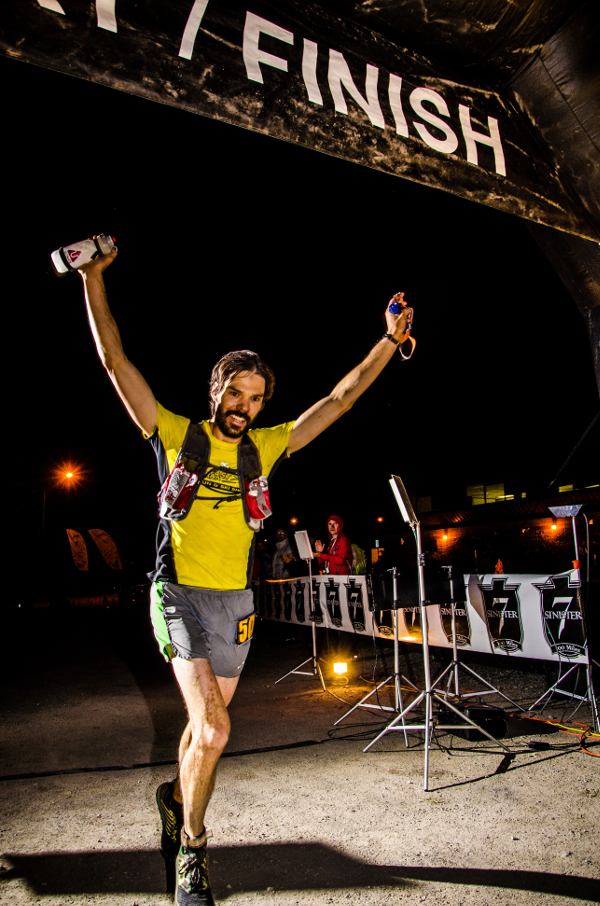What do string theory and ultramarathons have in common?
Well, for starters UAlberta mathematician Vincent Bouchard excels in both fields.
String theorist and former Rhodes Scholar, Bouchard is an associate professor and associate chair (undergraduate) in the Department of Mathematical and Statistical Sciences. He also won the Sinister 7 in 2014, an ultramarathon spanning 160 kilometres with an elevation gain of 5,687 metres.
Depending on how you look at it, an ultramarathon isn't something you necessarily set out to "win." Most people are just happy that they managed to complete it. But Bouchard isn't like most people. That's part of what makes him an exceptional instructor and researcher.
Born to run
The story starts in 2008 when Bouchard suffered a blown anterior cruciate ligament, or ACL, while downhill skiing. Needing something to rehabilitate his knee, he turned to running. He signed up for his first marathon in 2009 and was hooked by the intensity of accomplishing something he never thought he could do.
"The challenge is not being able to run it. The challenge is to allow your mind to free your body to let your body run."
Fascinated by the mental stamina required for endurance runs, and inspired by the book Born to Run by Christopher McDougall, Bouchard has been running four or five ultramarathons a year since his first in 2012, the Canadian Death Race. In 2014, just two years after his first ultra, Bouchard clocked his best marathon time at 2:47 and came in first at Sinister 7, running 100 miles in 19:10:01. All of this on a torn anterior cruciate ligament, medial collateral ligament, and meniscus.
Mind over matter
The key to success?
Incorporate multiple goals, says Bouchard. At last year's Fat Dog ultramarathon, Bouchard had three goals, each designed to progressively increase the odds of achieving the next. The first goal was to finish under a prescribed time. The second goal was just to finish. And the third? The third was to stay happy and smile the whole way.
This is a powerful life hack for anyone who might be struggling-be it with research, a race, or anything in between. Take it from a string theorist-he knows a thing or two about seeing things to the end.
It's fascinating to speak with Bouchard about wrangling the runaway mind. He speaks of "the wall," which all runners know as the first of many gruelling obstacles to overcome. Bouchard approaches running the same way he approaches his research: with an inquiring mind and persistence.
"The process of a long race is fascinating," says Bouchard. "If you let your brain run loose, then it's like living a whole life compressed into a short amount of time. You have your highs, and then you get lows. You're on a roller-coaster, and your brain is telling you to stop. This is the whole challenge, which I find fascinating. To try to stabilize your mind, to prevent these highs and lows from happening. And it's very close to exactly what you do in research."
Perseverance and grit: Improvise, adapt, overcome
Bouchard is the epitome of perseverance, in both research and endurance sport. He has a way of acknowledging adversity and then dismantling it so he can push forward.
It's the mental aspect that really got him into the sport, and he feels that researchers in theoretical sciences are particularly adept at training for this sort of adversity. "In research, you want to solve a problem, or prove something," Bouchard explains. "You try something, and it fails. You try something else, and it fails. Then you try something and you think it works. You're ecstatic, and then you realize there was a mistake. And it's always like this, but you have to keep your mind stable."
Researchers, Bouchard suggests, possess an advantage in racing, because they are used to the mental challenge. It's what they do every day.
"Being stuck on a problem, having to think about it non-stop, always having to overcome obstacles-this is the kind of challenge that presents itself in research," he explains. "And it's exactly the same in a long race. The challenge is not being able to run it. The challenge is to allow your mind to free your body to let your body run."
This kind of metaphysical thinking is an important tool for athletes and researchers alike. Bouchard says that when you are trying something new and challenging, your mind is going to try to convince you to give up.
The solution? "If you try to control your race, then you're gonna fail. Let these thoughts of stopping go, and don't let your mind control you."
Researchers who run
Vincent Bouchard isn't the only scientist who feels the connection between ultramarathons and the research grind.
Two PhD students in his lab, Nitin Chidambaram and Aniket Joshi, also run ultras. So too does Tom Scully ('17 PhD), a post-doctoral fellow in the Department of Chemistry.
"As far as the similarity between running ultras and research goes, I think it helps not to get discouraged by any setbacks or think too far into the future," says Joshi of running and research. "Instead, focus on the process and doing the motions in the moment. If things are not going too well and you feel low, one can be patient and try to not take these emotions too seriously."

